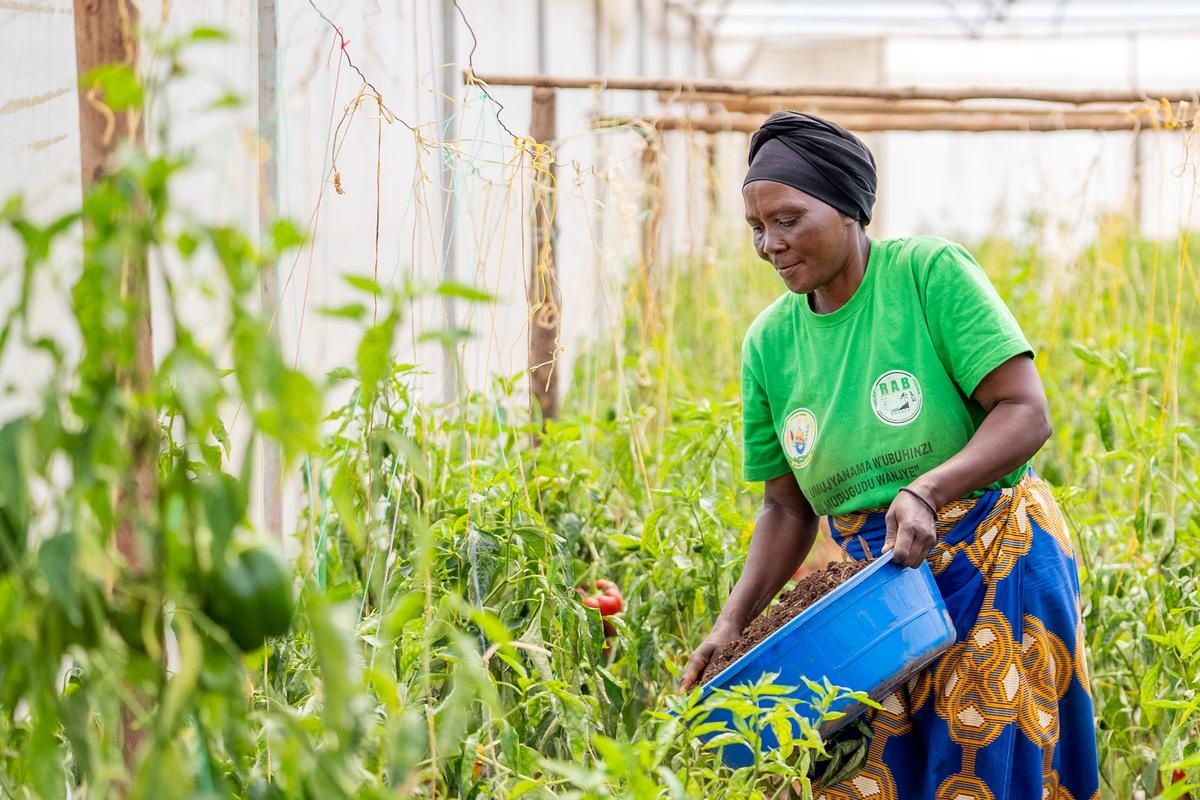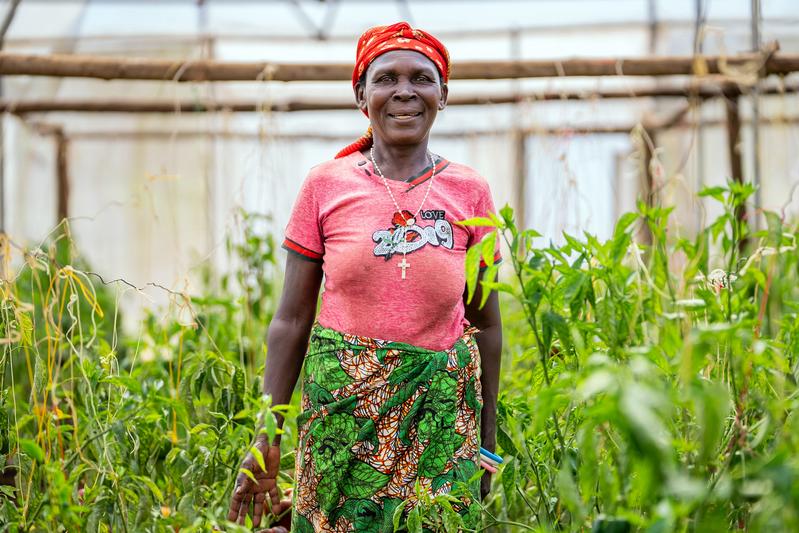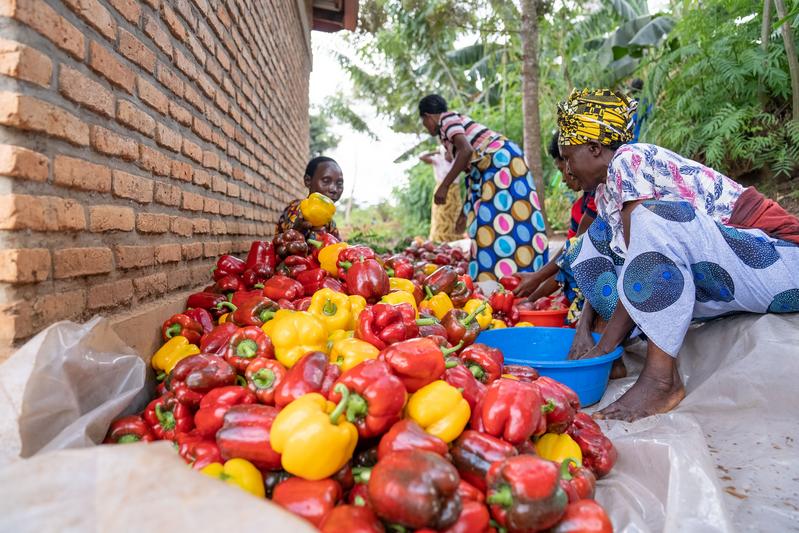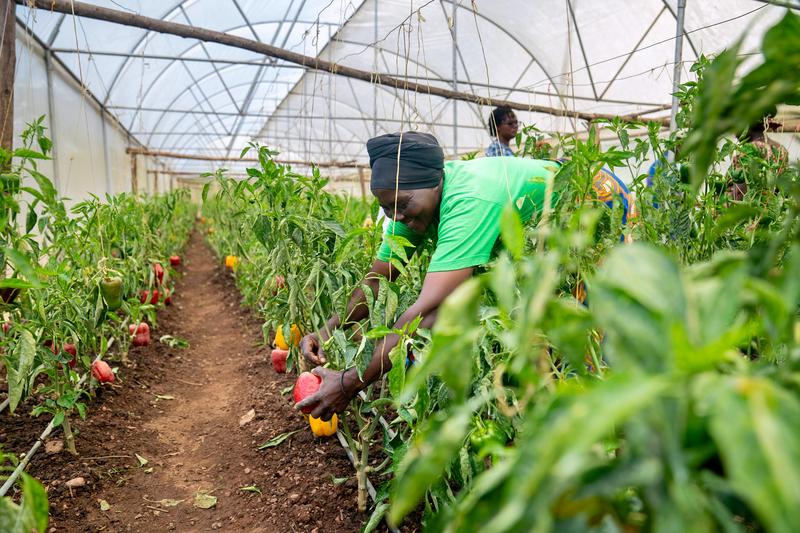Empowering Farmers in Rural Rwanda: PIH Supports Greenhouse, Collectives
The greenhouse helps combat food insecurity, creates sustainable livelihoods
Posted on Jul 11, 2023

It is late June, and farmers in Kirehe, a rural district in eastern Rwanda, are harvesting, cleaning, and packaging yellow and red peppers for transportation to the market. This achievement didn’t come easily: it is the result of a greenhouse, where carefully-planned conditions have helped the vegetables develop their ideal color, shape, and size.
This greenhouse, established in 2020 by Inshuti Mu Buzima, as Partners In Health is locally known, is specifically aimed at addressing food insecurity and creating sustainable sources of income for impoverished families. Farmers enrolled in the program include those with chronic illnesses and those with young children suffering from malnutrition.
One of the farmers at the greenhouse is Anthonia Nyiransengiyaremye, 61, a single woman who found herself caring for her malnourished grandchildren after her daughter was diagnosed with HIV and moved out.
“When my daughter found out that she was sick, the news took a toll on her mental health,” said Nyiransangiyaramye. “She moved far from the neighborhood to start a new life, leaving me with two babies, aged 9 months and 3 years old.”
Nyiransengiyaremye struggled to provide for the babies for several months. Then, she visited the local health center for a workshop on nutrition and learned of a new resource: a farming collective called the Twitezimbere self-help group, supported by Inshuti Mu Buzima. (Twitezimbere translates to "self-empowerment" in English.)
The group provided her and other members, selected based on financial and health needs, with stable access to food and cash to support their households. Inshuti Mu Buzima supports 148 similar groups with 1,744 members and 5 cooperatives with over 733 members in Burera, Kayonza, and Kirehe districts in Rwanda. Members of these groups are involved in agriculture, livestock rearing, crafts such as basket-weaving, and financial savings, among other activities.
Nyiransengiyaremye and other members were given livestock and received training sessions on various topics, including modern farming techniques. They expressed a desire to focus more on agriculture. In late 2020, Inshuti Mu Buzima constructed a greenhouse for the group, provided seeds, organic manure, and pest control, and even hired an agronomist to mentor the farmers.
“This greenhouse is a great resource,” said Nyiransengiyaremye. “The crops we cultivate in this greenhouse grow well and the harvest is sold well on the market.”

Climate Resilience
Producing crops and growing families’ income aren’t the only outcomes of the greenhouse. It’s also a way to build resilience to climate change.
This modern farming initiative in a rural community exemplifies how Inshuti Mu Buzima, through its Program on Social and Economic Rights (POSER), strives to break the cycle of poverty and illness by building farmers' resilience to climate change. Located in the eastern province, the hottest part of Rwanda, Kirehe has experienced changing weather patterns over the past several years that have disrupted the traditional agricultural seasons. Small subsistence farmers like Nyiransengiyaremye, who depend solely on natural conditions for crop cultivation, have been particularly affected.
Rwanda's agricultural seasons are typically divided into two main cultivation seasons: the first season runs from September to January and the second season from February to June. During the dry season between June and September, the scorching heat and dry soil mean that farming is only possible with irrigation—a labor-intensive task that involves fetching water from streams downhill and carrying it up the mountain to the fields. However, many members of the Twitezimbere group lack the strength and money required for this method.

Even during the cultivable seasons, a single climate shock such as heavy rains can devastate entire crops, jeopardizing the livelihoods of farmers and their families. In May, for example, heavy rainfall caused floods and mudslides that resulted in the loss of 130 lives, as well as destruction of houses and crops in different parts of Rwanda.
Jeanne D’Arc Murekatete, Inshuti Mu Buzima's livelihood manager, explains that as farmers achieve economic stability through agriculture, they can access essential needs.
“Our farmers pay health insurance on time,” said Murekatete. “Even when they are sick, they can afford the cost of treatment and medication because they have savings from the fruits of their labor.”
She also highlights that bringing farmers together regularly plays a key role in building a sense of community and supporting their mental health, especially for those who struggle with depression.

Projects like the greenhouse and farming groups also serve as a financial safety net for communities, enabling farmers to generate income from their harvests and use the funds for essential services such as education, quality housing, health care, and food.
“We used to provide direct support like food packages, “said Murekatete. “But now we don’t have to, because they pay for it using the money they make.”
As the members of Twitezimbere wind down a busy day of harvesting, they have successfully harvested 603 pounds of peppers which will be sold at nearby markets and in bigger cities like Kigali.
“We are thinking of planting peppers again because it is a good cash crop,” said Nyiransengiyaremye.

